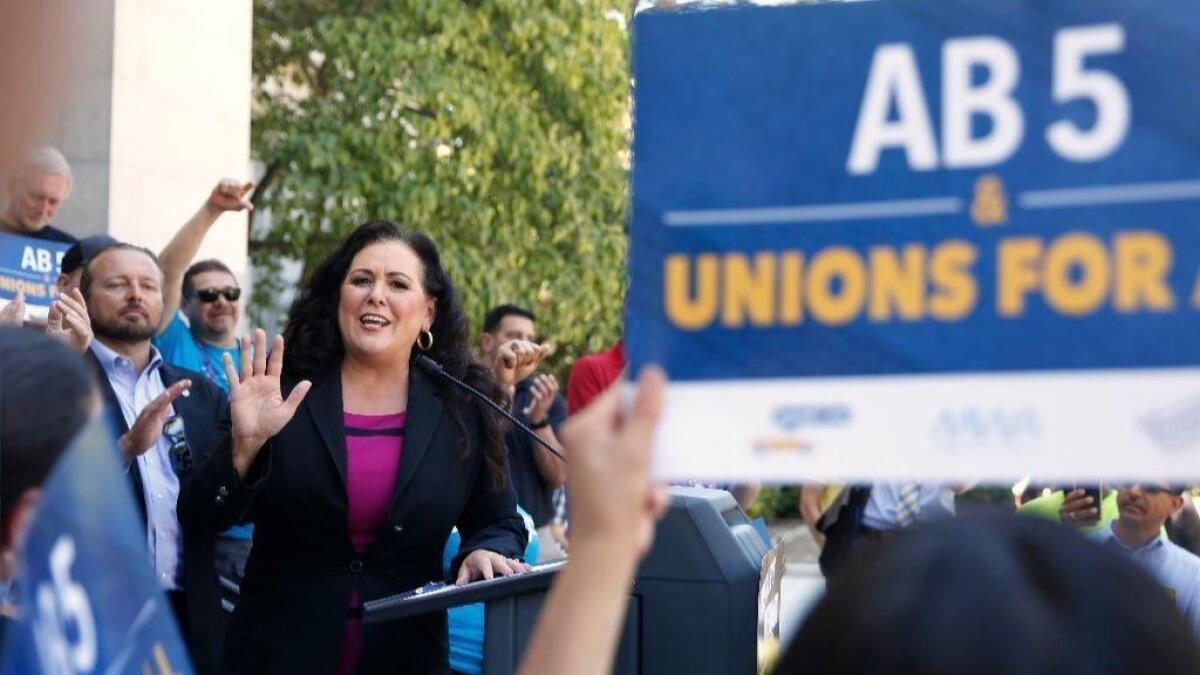Uber and Lyft drivers swarm Sacramento as lawmakers advance gig workers’ rights bill

Reporting from Sacramento — On many mornings, Minda Aguhob, a Harvard-educated data scientist who started driving for Uber and Lyft five years ago as she struggled to find a job, opens her Uber app around 6 o’clock, hoping to hear the familiar ping of a ride request from her first passenger of the day. Wednesday morning was different. At that hour, Aguhob, along with 30 or so of her fellow Uber and Lyft drivers, was piling onto a bus parked outside the West Oakland BART station to make the hour-and-a-half drive to Sacramento.
Forgoing earnings for a few hours, these drivers headed to the Capitol to join hundreds of other contractors and drivers from across the state in the hope of persuading legislators to pass Assembly Bill 5, the effects of which would include forcing Uber, Lyft and other app-based on-demand services to treat their pools of contractors as employees.
Although the bill has broad support from labor groups and many drivers, who laud the protections it would confer on workers, it also faces opposition from some segments of gig workers who fear that it would strip them of the ability to work when they want to.
The day got off to an inauspicious start. Gig Workers Rising, the activist outfit that organized the trip, postponed the departure as drivers struggled to find all-day parking at transit stations and others considered whether they should drive to Sacramento on their own in order to make it back in time for their second jobs.
As the bus made its way west on Interstate 80, drivers discussed their personal situations. Some described a huge drop in their income in the last two years. Others traded tips on where and when to drive in order to maximize earnings.
“I have to drive so many miles and many hours to make money,” said one driver named Hassan Radman.
Another driver, Ezekiel O’Brien, dismissed concerns that granting gig workers employee benefits would make the companies that employ them financially unsustainable.
“If Uber and Lyft can’t exist as companies and pay a living wage then that’s not a good business model,” O’Brien said. “That’s why I say move your offices out of San Francisco, quit the catered parties, stop investing in flying cars and be a transportation company.”
Upon reaching the Capitol, the San Francisco drivers joined others on the statehouse lawn including independent groups such as Rideshare Drivers United, who journeyed in a caravan through the night from Los Angeles to make it to the Capitol in time for the hearing on the statehouse lawn.
Against the backdrop of the Capitol building, with music playing over speakers, members of unions such as SEIU, the Teamsters and Communications Workers of America ate breakfast alongside gig workers as they prepared for a full day of lobbying legislators. Chants of “workers rights are human rights” were heard on the sidelines as groups of drivers received instructions on how to lobby the senators who had yet to vote on AB5.
The Senate Labor Committee hearing began with testimony from AB5’s author, Assemblywoman Lorena Gonzalez, as a line of hundreds of drivers, other workers and union members donning brightly colored shirts wended through the halls of the Capitol waiting to state their support for the bill. While the bill supporters filtered into the small hearing room, drivers who were guided by representatives from Service Employees International Union, the Teamsters and other unions dropped into the offices of senators and Assembly members to lobby them to vote to pass AB5.
Before breaking drivers from Gig Workers Rising into groups, SEIU California’s deputy political director, Kirsten Clemons, distributed instructions and talking points and encouraged the drivers to share details of their lives with senators. “The one thing that breaks through all of [the noise] is your stories,” Clemons said.
One group of San Francisco drivers visited the offices of Sen. Scott Wiener (D- San Francisco) and was met by two staffers, who listened and took notes.
“Uber’s co-founder is worth $6 billion,” a driver named Kerry said to Wiener’s staffers. “Some drivers are thousands of dollars in debt. They can hardly afford to make basic living expenses. It’s inexcusable, we’re asking for support but we’re also asking for unions so we can negotiate fairly and not just let them set the rules for the playing field and we just have to suffer through that.”
Meanwhile, the Senate’s Labor, Public Employment and Retirement Committee was more than an hour into the public comment session with no end in sight as drivers, firefighters, hairstylists and other workers as well as union members waited to voice their positions on the bill. The stakes are high. Uber and Lyft say it would make it harder for them to grant drivers flexibility to work where and when they choose.
Switching from a contractor to an employee model would require major shifts in how these companies operate, at least in California. They would have to guarantee a minimum wage and overtime, pay into Social Security and Medicare, and offer unemployment and disability insurance, workers’ compensation, sick leave and family leave. They would also have to reimburse workers for mileage and maintenance of their vehicles.
The topic of employee classification has exposed some divisions between labor unions. The hearing comes after months of attempts by the tech companies to get at least two labor groups — SEIU 721 and the local chapter of the Teamsters — on board with a grand compromise that would allow them to continue to treat workers as contractors while affording them some new protections such as a benefits fund.
The California Labor Federation, which represents more than 1,200 unions in the state and sponsored the bill, however has refused to make any concessions on employee status and insists it should pass as is.
Disagreement within the gig workers’ ranks was on display Tuesday afternoon when pro- and anti-AB5 drivers rallied outside the Capitol. The majority of the drivers who showed up on Tuesday were seeking changes to the bill that would echo the compromise the tech companies are attempting to discuss with labor groups. They were organized through a coalition funded by the California Chamber of Commerce, called the I’m Independent Coalition, as well as Uber and Lyft. Uber drivers received in-app notifications inviting them and their families “and anyone you know who also has a stake in maintaining driver flexibility” to rally on Tuesday, ahead of the hearing.
Countering their calls were drivers represented by the Mobile Workers Alliance, which is affiliated with the SEIU. The group denounced what it called a “propaganda rally” and claimed Uber and Lyft were continuing to try to mislead drivers by telling them AB5 would threaten the flexibility of their jobs. These groups met with Gov. Gavin Newsom’s chief of staff, Ann O’Leary, on Tuesday to call on the governor to support the bill.
Two hours into Wednesday’s public comment session, workers representing industries including the gig economy and the recording business were invited to speak to the committee in support of amending the bill . One Lyft driver said she chose to be an independent contractor because working when she wanted enabled her to balance two jobs.
“I understand that there are things that need to be discussed and employee protections,” she said, strongly encouraging the committee to vote no until changes could be made to protect flexibility. “And Lyft is working on this.”
The discussions between tech companies and unions continue, although it’s looking less likely that any kind of alternative deal, if reached, could be proposed as an amendment to AB5. Instead, it may have to be introduced as a separate bill, several sources said.
“If a compromise is simply something where the workers lose out or have some substandard employment status or substandard voice at the table … I can’t imagine in this bill that I’d be the one to allow that kind of compromise,” Assemblywoman Gonzalez said to the committee.
“We have companies [whose] CEOs and COOs are making $45 million a year. They went public, it’s a billion-dollar corporation, and their drivers, as we hear, are sleeping in their cars.”
Ultimately, the Senate Labor committee voted to pass AB5, sending it to the Appropriations Committee and then to the Senate floor.
After the hearing closed, Aguhob emailed a letter to senators urging them to pass AB5 and ensure drivers like herself would be eligible for minimum wage. “I’m trapped,” it read. “Trapped in a vicious cycle, I’ve tried to break out for years.”
She hit send, then joined her fellow contractors and bill supporters on the steps of the Capitol as they chanted “Thank you, Lorena.” They then boarded the bus back for Oakland, and another weekday of rides starting at 6.







